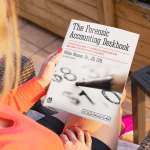Why Daubert Challenges Suck for Forensic Accountants

The Forensic Accounting Deskbook by Miles Mason, Sr. JD, CPA, published by the ABA Family Law Section
Don’t lose a Daubert challenge. How does a Daubert challenge impact a financial forensics career?
For a much more detailed discussion, see The Forensic Accounting Deskbook: A Practical Guide to Financial Investigation and Analysis for Family Lawyers, Second Edition, authored by Miles Mason, Sr. and published by the ABA Family Law Section. This updated edition of one the ABA’s most popular resources explains the practice of forensic accounting and business valuation and how to apply it in family law cases. It provides a practice-focused introduction to the core financial concepts in divorce, such as asset identification, classification, and valuation, income determination, expenses, and more.
VIDEO TRANSCRIPT:
Tracy Coenen: So you mentioned a Daubert challenge. What is that and how does that play into the federal rules of evidence?
Miles Mason: A Daubert challenge is based on a particular federal case, Daubert v. Merrill Dow Pharmaceuticals, and that sets a very structured analytical framework for a court to file to determine whether or not a particular witness can talk about a particular subject. Now, without going into too much detail in this presentation, a Daubert challenge is brought by the opposing experts or the opposing party’s lawyer to challenge a particular expert to preclude that expert for being able to speak on that particular topic. And it’s very important because, as a forensic accountant or expert witness in any field, it’s very important that if you’re ever challenged under a Daubert challenge that you want to be able to win. Because the court is judging your credentials, experience, judgment, history. Everything about you is being judged to determine whether or not you’re allowed to proffer evidence, aka issue an opinion that’s going to be admitted in a court on a particular issue. Very important to an expert witness to study Daubert, study the cases that come out on an ongoing basis, especially if you’re a full-time expert witness. And so, Daubert lays out that challenge for you. And to be prepared, as a forensic accountant, I want to know how do I build my resume around defending against a Daubert challenge? And that’s important as well. And we’ll be talking more about that later.
Tracy Coenen: So if an expert loses a Daubert challenge, and the judge says the expert is not allowed to testify in the case, is that something that’s going to affect the expert going forward in their career?
Miles Mason: Yes and no. I mean, the fact that that an expert witness was precluded from testifying on a particular topic isn’t terribly important in future cases. But the expert nonetheless has to answer questions in the future. “Have you ever been excluded under a Daubert challenge?” And an expert witness for the rest of his or her career has to answer “Yes.” And that’s not fun, but it’s a reality. And the question is, of course, was that witness denied the ability to testify on that particular topic, that’s the same for this other lawsuit that they’re currently being proffered for? And so, if it is the same topic, it could be very, very important.
Tracy Coenen: So, if opposing counsel thinks that an expert has come to the wrong conclusions or doesn’t have the right credentials to be putting forth an expert witness opinion, will they always file a Daubert challenge?
Miles Mason: A Daubert challenge is a very strategic challenge. There could be reasons why they would not bring a Daubert challenge. Trial strategy. It could be they actually want the expert witness to go up there and destroy that expert’s credibility. But I would say in most financial cases, in my experience, if a lawyer can bring a Daubert challenge, they probably will.
Thank you to Tracy Coenen, CPA, CFF for inviting me to join her in this video series. Tracy is a nationally recognized forensic accountant practicing in Milwaukee and Chicago.









